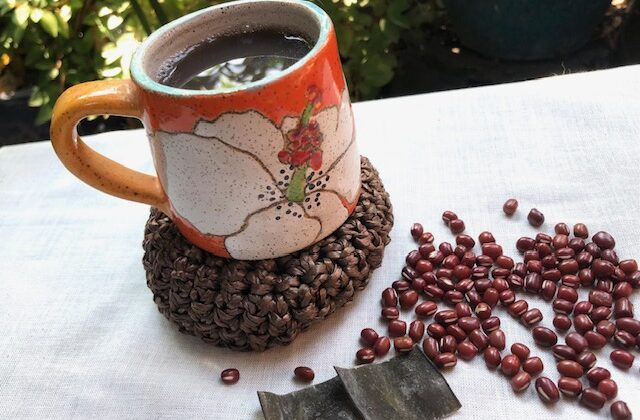One of my favorite beans since childhood is the azuki bean, also known as red beans by some people.
In America, some people spell it adzuki instead of azuki.
Azuki beans are very popular in Japan.
They are the second most popular bean after soybeans, holding a prominent place in both traditional and modern Japanese cuisine.
I love eating azuki beans with sweet rice (sticky rice), which is called Osekihan お赤飯 (recipe on “Love, Sanae” cookbook page 37).
Osekihan is often served on special occasions, particularly celebrations in Japan. Japanese people often serve Osekihan at happy events. It could be the celebration of a birth, a birthday, graduation, admission to school, or a celebration of a long life. I heard that the red color is a symbol of auspicious and powerful spells that can ward off disaster. Osekihan also served the role of talisman at various occasions.
Osekihan is usually made with 2/3 cup rice and 1/3 cup red beans, but my grandmother used 1/3 cup rice and 2/3 cup red beans. It was a very deep reddish color, full of red beans. I remembered it being my favorite!
Azuki beans are also used for soup and desserts.
In macrobiotics practice, we eat azuki beans to support the kidneys and bladder. The kidneys and bladder are more susceptible to issues during the wintertime, making azuki remedy tea particularly beneficial during this period.
Even in summer, when we’re living in a cold, air-conditioned room, many of us may have health issues with our kidneys and bladder – the kidneys become contracted, creating tight muscles around them and intensifying even our thinking. The kidneys do not like a cold environment, so wearing a cotton belly warmer or a cotton tank top underneath your clothes, even in summer, and drinking warm tea, especially adzuki tea, can help improve urinary function and reduce swelling.
Adzuki beans play an important role in treating constipation, supporting heart health, and aiding the kidneys and liver, serving as a diuretic and detoxifier.
Adzuki beans also contain niacin, a vitamin that stabilizes the mind.
I recommend drinking Azuki remedy tea to relax both your body and mind.
Recipe:
Azuki Remedy Tea (“Love, Sanae” cookbook page 197)
Ingredients:
1 cup (200 g) dry azuki beans
4 ~6 cups filtered water
2-inch piece of kombu sea vegetable
1. Rinse the azuki beans with filtered water, strain them, and place them in a pot with filtered water.
2. Bring it to a boil without a lid, add kombu, and simmer with the lid for 1-1.5 hours.
3. Now, azuki remedy tea is ready, so you can drink it on an empty stomach between meals to enjoy and support your kidneys and bladder.
4. Once the azuki remedy cools off, save the rest for later in the refrigerator. When you drink it, you need to heat it by simmering (do not boil).
I’ll post a recipe for using leftover azuki beans to make a dessert “Azuki Yōkan” next time.
Try making and drinking azuki bean tea, which helps support the kidneys and bladder by eliminating waste and excess water from the body through urine!
Love,
Sanae❤️
Extra information about Kidney:
The kidneys not only “excrete waste products,” but also use the urine concentrating mechanism to regulate the amount of water in the body and the concentration of substances called electrolytes, such as salt and potassium. Acidic substances that are constantly produced in the body are excreted through the kidneys, keeping the body slightly alkaline. The kidneys excrete waste products and excess water from the body as urine. When this function declines, excess water remains in the body, causing gradual weight gain and swelling.

